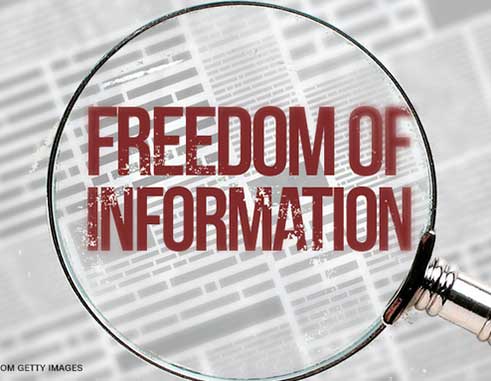
MOST States are moving towards enactment of a Freedom of Information Act as a push towards the transparency and accountability so vital to the life of our democracies. Does St Lucia need a Freedom of Information Act or is it that our cultural proclivity for roro surpasses that legislative need? There were two highly classified documents over the last two years which one would have thought would be held in tight guard. We found out during the last election campaign that the IMPACS report was leaked, despite the then Prime Minister’s insistence that this is so highly confidential that it could not be relayed to the public.
Quite recently we saw the just signed Desert Stat Holding Agreement vividly displayed on Facebook, within days after the ink dried. Yet despite these major ‘bust pipe’, we are past leaks in St Lucia, there is merit in the pursuit of a Freedom of Information Act.
There is an interesting case still ongoing in Trinidad concerning the interpretation of Section 35 of the Freedom of Information Act. The Joint Consultative Council for the Construction Industry (JCC) had gone to the court to force the Government under the Freedom of Information Act to release the legal opinion on whether the tender for the Invader Bay project was in keeping with the Central Tenders Board Act. The Judge who heard the matter gave judgment that the legal opinion should be released. The State appealed the judgment and the matter went to the Court of Appeal.
The Court of Appeal moved far away from the Invader Bay issue to dealing with the Freedom of Information Act and its interface with the Constitution, a far larger issue. All three Judges of the Court of Appeal upheld that legal professional privilege ‘prima facie’ applies to the instructions given and the advice received in the Invaders Bay matter. This meant that the State can claim legal professional privilege as a reason for not releasing the legal opinion.
The departure came as to whether Section 35 of the Freedom of Information Act – the public interest override provision, holds in this matter. The Court of Appeal stated that the Government of Trinidad and Tobago ( GOTT) did not inform the JCC that a Section 35 evaluation had been carried out and nor was there demonstration that there was justification for denial of access.
The present government who stood with the JCC in demanding the release of the legal opinion when in opposition, in a most surprising decision decided to go to the Privy Council for review. One believes the concern is that the bar that the Court has set as to what is defined as ‘public interest’ is considered too low for the political directorate. The Court is of the opinion that the Section 35 reasoning must be adequate and intelligible for refusal, and that these reasons must sit in the Constitution which promotes participatory democracy, and promotes transparency and accountability in the decision making of public authorities. This bar is very low indeed in the historical context of our institutional secrecy in Caribbean democracies.
We have to accept that there are major leakages in our economy due to corruption in Saint Lucia, and the only way to create the transparency and accountability that are now the’ Mutt and Jeff’ of local political lingo, is to legislate a Freedom of Information Act. I believe the Act will bring a level of discipline in the operations of the State in that actions and decisions can be placed for public scrutiny in the future. There is a primary responsibility that devolves upon every citizen which is the protection and promotion of our democracy. Our Constitution places that responsibility upon every citizen:
“We the people of Saint Lucia consider that individually, each person has duties towards every other and to the community and is under obligation to observe and promote the rights, freedoms and values recognized in this constitution’’
We cannot run away from that responsibility and despite the ‘politics of squeeze’, which I am very familiar with; we have no choice but to continue to run the good race and finish well. One of the dangers of the Facebook world is that it has created ‘cyber cowards’ who hide behind false names and spew venom, they do not possess that dual God given spherical mass that brings boldness to take responsibility for one’s discourse. These ‘cyber cowards’ are a danger to our democracy and in the wonderfully coined phrase, are indeed – ‘Irrelevant details’.















But………..
1984’s
BIG BROTHER……………..
……………is watching
Animal Farm 🙁
with the fangs and unilateral ferocity of a Doberman, Pit Bull Cross bred….. OUI!
I refer to a recent story in the stlucianewsonline website where “the Ministry of Health and Wellness called an urgent planning and strategizing meeting at its main office this morning…”
It always concerns me when public agencies make “glossy” pronouncements in the media to avert the public’s attention to its own accountability. However, this one did not escape my attention.
The report boldly confirms that the fire affected the medical records room, so it had me thinking, but isn’t medical records the basis by which patients health issues are managed? Aren’t records the only way by which the State is held accountable to uphold the rights of citizens? To me it seems that the hospital administration places little significance on the records as i am not aware that the agency responsible for the management of public records, the National Archives, was not invited or involved. But shouldn’t that be a priority and of concern to us? What are the circumstances under which a fire broke out in a place where the most security is to be afforded?
If we delve into the field of information, we will find out that records management is the only method by which public agencies and their officers can be held accountable, operate in transparent manner and guarantee the public their democratic rights.
So how could the public demand accountability? How can public officials claims that they are transparent and accountable when the sole institution which is charged with the management of public records is either left out of the loop or just plain incompetent to handle public information crisis when they arise?
People say that corruption is caused by corrupt people but information experts are convinced that it is caused by non existent or inadequate records management. How comes in this day and age (information age) that the records of Ministers, Prime Ministers (phone calls, electronic messages, conversations etc.) are not protected and preserved under a special law which is enforced by the National Archives? Shouldn’t the requirement to keep and protect public records be enshrined in our Constitution rather than being at the pleasure of the “Minister” who, by legislation is responsible for the Archives and the records that the Archives seeks to preserve.
By examining the facts and the present status quo wouldn’t controversies such as St. Jude, Grynberg, allegations against Guy Joseph and numerous other controversies been solved if records mandated to be preserved were preserved? Presently our “go to guy” for information to prosecute St. Lucians seems to be the United States. Why? Because their laws mandate that records be preserved. So why don’t we do it for ourselves? Are the same people who are at the center of such controversies, meaning the politicians/law makers, the same people who are tasked with implementing such records protection measures? But isn’t that again the same group who is responsible for vetoing the public demand for more accountability through a Constitutional Reform process?
We have a freedom of Information Act on our books since 2005; however it has never been given assent or a commencement date by those same politicians. Though my concerns of public information management is quite dated, I refer to a recent piece in the Voice of St. Lucia dated December 10, 2016, by John Peters “Fredom of Information Act for St. Lucia, at ” http://q54.6bf.myftpupload.com/2016/12/freedom-information-act-st-lucia/. I am in agreement with most of what he has said, however, through no fault of his own, the actual situation is much more dire than Peters suggests.
As with all St. Lucians, politicians included, clamoring for accountability and transparency why haven’t we and by extension the politicians, turn to the obvious? Records management can also be the catalyst to good crime fighting, intelligence management and the administration of justice crucial ingredients needed to stem this current crime wave that no one seems to have an answer to. Instead governments have gone ahead and shown us the opposite in acting privacy laws that would protect information of certain groups of individuals. When min government, they criticize opponents for favoring the leaking of public information however, when in opposition they cry foul because they are on the other side of the “information wall” and even they even call and encourage public officer to leak information.
My opinion is that the longer there is confusion, the more it allows division to flourish. Who wins when division is rife within our communities? The politicians. So would they have any intentions of making public information accessible and people knowing their rights? I doubt it. Would an information starved opposition insist or pressure the government to pass the law and adopt such records management practices? I also strongly doubt. Why? Because they are the government in waiting; why would they encourage the implementation of a measure where if tomorrow they were elected into office they would be subject to open scrutiny.
My last question is: would the public pressure the authorities to implement such measures that would benefit their interest in seeing that the country is placed on a accountable and transparent footing? Well sad to say, this is what i doubt the most. Since we are such extreme political fanatics or hacks i most strongly doubt. But isn’t that ironic that we compare ourselves to the US and declare that we are independent when we are actually dependent on the records of other countries for our own stability. What if as we have come to realize that the records and records keeping practices of those other countries that hold our dossiers can be compromised? I refer to the recent findings that US information society has been severely compromised by the infiltration of Russian bots. What are media organizations and other information professionals doing about it?